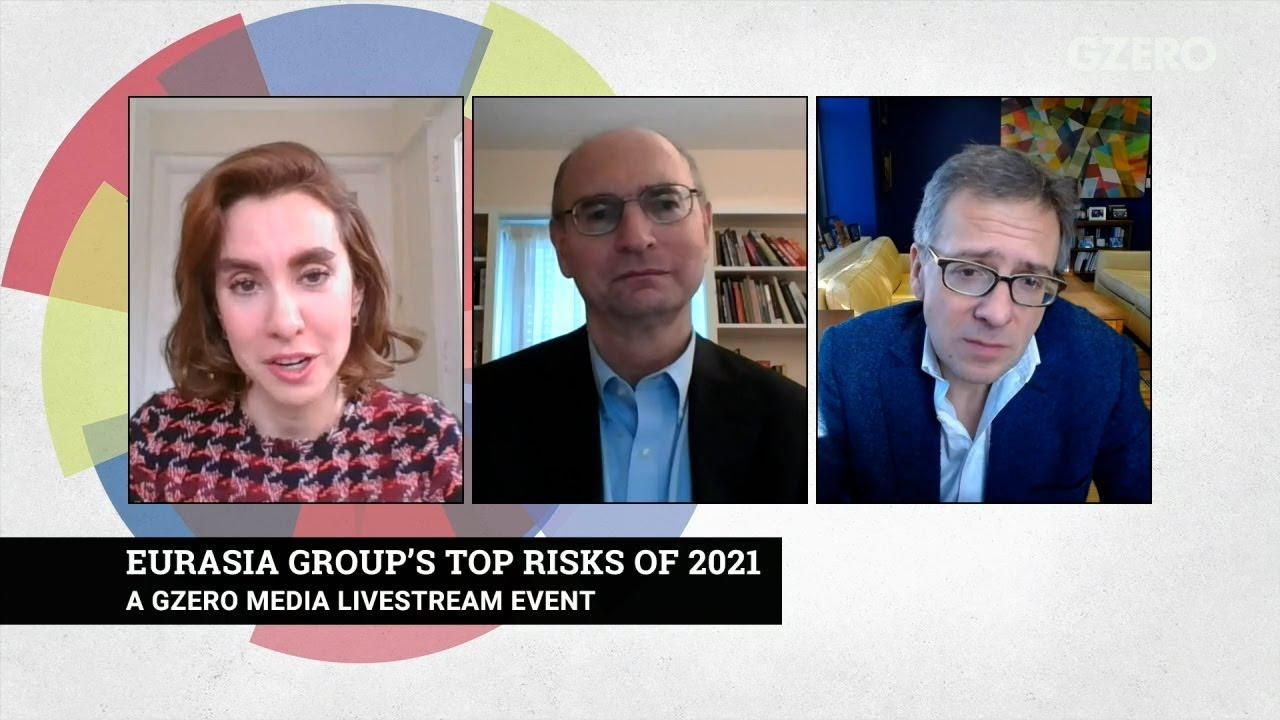Events
2021's Top Risks: global challenges intensify

2021's Top Risks: Ian Bremmer & Eurasia Group on the Big Global Threats to Come | GZERO Media

Eurasia Group today published its annual list of the main geopolitical threats for 2021. For the second year in a row, the #1 Top Risk is rising political polarization in the United States, which not many years ago was deemed one of the world's most stable nations, with strong institutions and — as the sole global superpower — with a clear mandate to lead the world on many fronts.
That's all gone, for now. Why, and what does this mean for America and other countries?
As outgoing US President Donald Trump continues to undermine democracy by questioning his recent election loss to Joe Biden, and Republican lawmakers heed Trump's call to erode the legitimacy of US political institutions, we've reached a new normal in American politics, Eurasia Group Chairman Cliff Kupchan said during a livestream discussion to launch the 2021 Top Risks report.
That new normal is that in future US elections, the American president will be rejected by half the country no matter his agenda, Kupchan explained: in the current political environment, the world simply cannot look to the US to solve any global problem, much less a once-in-a-generation crisis like the coronavirus pandemic.
For Ian Bremmer, president of GZERO Media and Eurasia Group, America is in no position to provide global leadership at a moment when other countries would have hugely benefited from it, so other rising powers may fill the void created by the US abdication from its own role as superpower. The prime candidate to do so is China, which is increasingly competing with the US for global influence.
Indeed, Kupchan expects US-China rivalry to intensify — albeit in a different way than under Trump — when Biden takes office. There'll be a bidding war between both sides to win global hearts and minds as the new US president attempts to "multilateralize" US competition with China on issues such as COVID-19 vaccines or green technology.
Bremmer believes that China has the upper hand in vaccine diplomacy, and that unless Biden's US vaccine rollout is a roaring success, China is better positioned to exercise its soft power throughout the developing world with jabs that are cheaper and easier to distribute than the American vaccines.
Sustainability will be another arena for competition. Biden will try to clip China's wings on Chinese quest to benefit economically from the world's renewed push for renewable energy due to the pandemic, Bremmer added.
A longer-than-expected recovery from COVID-19, furthermore, is poised to make the world even more "GZERO" than it was a year ago. Kupchan said that the lasting scar tissue of the pandemic will create haves and have nots between and within countries in a leaderless world where the US is simply too divided to govern itself — let alone the international system it helped create after World War II.
For Bremmer, the coronavirus did not spur a more "GZERO" world, which we were already in before COVID-19, but underscored its urgency by accelerating all other geopolitical risks. It made everything a lot worse, a lot faster.
Watch the above video for more insights from both experts on other 2021 Top Risks, including why we'll see huge inequality in how different parts of the world recover from the 2020 public health crisis, and questions posed by readers. Check out the full report here and GZERO Media's summary here.People in support of former South Korean President Yoon Suk Yeol rally near Seoul Central District Court in Seoul on Feb. 19, 2026. The court sentenced him to life imprisonment the same day for leading an insurrection with his short-lived declaration of martial law in December 2024.
65: The age of former South Korean President Yoon Suk Yeol, who was sentenced to life in prison on Thursday after being found guilty of plotting an insurrection when he declared martial law in 2024.
In an era when geopolitics can feel overwhelming and remote, sometimes the best messengers are made of felt and foam.
The Hungarian election is off to the races, and nationalist Prime Minister Viktor Orbán is facing his most serious challenger in 16 years.
Does skepticism rule the day in politics? Public opinion data collected as part of the Munich Security Conference’s annual report found that large shares of respondents in G7 and several BRICS countries believed their governments’ policies would leave future generations worse off.